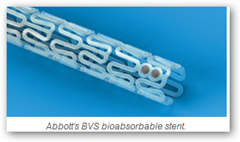We all know about biodegradable, well here’s the stent of the future design, it grown on you, literally, or I should be correct here and say it really dissolves, and there might be a bit of truth to both sides here.
Interventional Cardiologists and Radiologists are the ones you really want to know today if you have any heart problems or blockage in your blood vessels. I have posted quite a few articles here about interventional treatments. This is the the first that I can remember being one made with  material that will blend with what we have inside and still be effective. The studies conduced by Abbott are outside the US so far and the next phase is up an coming with enrolling over 1000 patients for the procedure. There’s certainly no rushing this evaluation as time is the only item that will show whether or not patients are doing well or have needed follow up treatments relative to the placement and performance of the stent. BD
material that will blend with what we have inside and still be effective. The studies conduced by Abbott are outside the US so far and the next phase is up an coming with enrolling over 1000 patients for the procedure. There’s certainly no rushing this evaluation as time is the only item that will show whether or not patients are doing well or have needed follow up treatments relative to the placement and performance of the stent. BD
Abbott Announces Positive Three-Year Data on Its Fully Bioabsorbable Stent Technology, Initiates Large-Scale International Trial
New ABSORB EXTEND Trial to Study Performance of Revolutionary Bioabsorbable Device in Approximately 1,000 Patients
ORLANDO, Fla., Nov. 16, 2009 – Abbott today announced three-year data from the first 30 patients in the first phase of the A BSORB clinical trial, demonstrating that its fully bioabsorbable drug eluting coronary stent successfully treated coronary artery disease and was absorbed into the walls of treated arteries. Patients in this first phase of the ABSORB trial experienced no stent thrombosis (blood clots) out to three years and no new major adverse cardiac events (MACE[1]) between six months and three years (3.6 percent at three years). These results were presented at the 2009 American Heart Association's Scientific Sessions.
To build upon the promising results of the ABSORB trial, Abbott is initiating a large-scale trial called ABSORB EXTEND, which will enroll approximately 1,000 patients from up to 100 centers in Europe, Asia Pacific, Canada and Latin America. ABSORB EXTEND is a single-arm study designed to further evaluate the performance of Abbott's proprietary fully bioabsorbable stent technology. The study will enroll patients with more complex coronary artery disease and is slated to begin enrolling before the end of the year.
"Abbott's bioabsorbable stent has the potential to be a major breakthrough for coronary artery disease patients. The data show that patients continue to do well three years after treatment with the bioabsorbable coronary stent," said Patrick W. Serruys, M.D., Ph.D., professor of interventional cardiology at the Thoraxcentre, Erasmus University Hospital, Rotterdam, the Netherlands, and principal investigator for the ABSORB trial. "The strong results confirm my belief that bioabsorbable technology is the next revolution in interventional cardiology."
Abbott also announced that patient enrollment is complete for the second phase of the ABSORB trial. The second phase of the ABSORB clinical trial enrolled 101 additional patients from 12 centers in Europe, Australia and New Zealand, and incorporated device enhancements designed to improve deliverability and vessel support.
Abbott is the only company with three-year clinical data evaluating the safety and performance of a fully bioabsorbable drug eluting coronary stent. Abbott’s bioabsorbable everolimus eluting coronary scaffold is made of polylactide, a proven biocompatible material that is commonly used in medical implants such as absorbable sutures. As with a metallic coronary stent, Abbott’s bioabsorbable technology is designed to restore blood flow by propping open a clogged vessel, and to provide support until the blood vessel heals. Unlike a metallic stent, however, a bioabsorbable scaffold is designed to be slowly metabolized by the body and is completely absorbed over time.
"Abbott continues to make advancements with its promising bioabsorbable technology," said Charles A. Simonton, M.D., FACC, FSCAI, divisional vice president, Medical Affairs, and chief medical officer, Abbott Vascular. "The second phase of the ABSORB trial enrolled very quickly, which is a testament to the excitement among the clinical community around the potential shown with this technology. We look forward to starting the ABSORB EXTEND trial to further evaluate promising attributes of our fully bioabsorbable technology in a broader patient population."
About the ABSORB Clinical Trial
The ABSORB trial is a prospective, non-randomized (open label), two-phase study designed to enroll approximately 130 patients from Australia, Belgium, Denmark, France, the Netherlands, New Zealand, Poland and Switzerland. Key endpoints of the study include assessments of safety – MACE and stent thrombosis rates – at 30 days; six, nine, 12 and 18 months; and two years, with additional annual clinical follow-up for up to five years, as well as an assessment of the acute performance of the bioabsorbable drug eluting stent, including successful deployment of the system. Other key endpoints of the study include imaging assessments by angiography, intravascular ultrasound (IVUS), optical coherence tomography (OCT), and other state-of-the-art invasive and non-invasive imaging modalities at six months, one year and two years.
Abbott’s bioabsorbable drug eluting coronary device delivers everolimus, a drug that inhibits tissue proliferation. Everolimus, developed by Novartis Pharma AG, is a proliferation signal inhibitor, or mTOR inhibitor, licensed to Abbott by Novartis for use on its drug eluting stents. Everolimus has been shown to inhibit in-stent neointimal growth in the coronary vessels following stent implantation, due to its anti-proliferative properties.
[1] MACE is a composite measure of key efficacy and safety endpoints and includes cardiac death, heart attack (myocardial infarction) and ischemia-driven target lesion revascularization.



0 comments :
Post a Comment